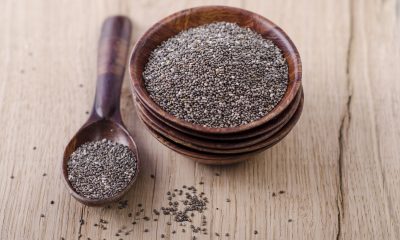Health
8 Benefits of honey water

Discover the 8 benefits of honey water.
The consumption of bee honey can be used both as a remedy and, above all, for the care of our beauty.
Did you know that drinking a glass of warm water with a tablespoon of honey every day can help you prevent diseases and certain pathologies?
Bee honey, raw or pure, is made up of enzymes, vitamins, and minerals that protect our bodies from bacteria. It is also an antioxidant that helps fight bad free radicals that damage our body and the appearance of our skin.
Thanks to its properties, this natural sweet not only increases hydration, it also helps increase the levels of good cholesterol in our body and reduces cardiovascular stress. It also helps improve our immune system, prevents diseases, and even helps us lose weight.
Preparation and frequency
-Bring water to a boil and mix it with a teaspoon of honey, your body will absorb it quickly.
-It has been scientifically proven that honey forms a compound in the water that increases the healing capacity of the water itself.
-Drink this drink frequently, supplying sugary drinks, and others that you usually drink to quench thirst.
-You can take several glasses a day, as long as you do not exceed the amount of honey.
-This drink is not a substitute for natural water, it is not recommended that you abandon the hydration that only pure water can offer you.
Benefits of honey water
1. Contributes to weight loss
To achieve weight loss it is important to reduce the consumption of sugary drinks in your diet; A good option is to eliminate soft drinks that are full of calories and instead you can drink water with honey.
The sugar in honey is natural and provides a healthy source of calories, it can also help avoid the anxiety of consuming sweet sugary drinks, by reducing this consumption, low-calorie intake, and with this also the kilos.
2. decreases allergies
The consumption of honey helps reduce our susceptibility to environmental allergies since the body acclimatizes to the pollens of the place where we live.
3. Helps to evacuate the intestine
Drinking a glass of warm water with honey on an empty stomach helps us improve our digestive system. The antiseptic benefits of honey relieve acidity in the stomach and increase the production of intestinal flow.
It also helps us to hydrate the colon and to produce water in the stool; all this makes it easier and more regular for us to evacuate.
4. Detoxifies the body
Evacuating regularly helps us eliminate the toxins that accumulate in our bodies and that cause diseases.
You can add lemon to honey water to increase the benefits, lemon contains citric acid that helps maximize the function of the enzyme and this, in turn, stimulates the liver and helps with detoxification.
5. Provides energy to our body
Coffee and tea can dehydrate us, replace these liquids with water with honey. Studies have shown that dehydration can make us feel tired.
Honey and warm water increase our energy as it is a natural sources of simple sugars and carbohydrates. So if you feel low energy try warm water with honey and see its benefits.
6. Reduces gas problems
Honey helps neutralize gases in our intestines. Drinking a glass of warm water with honey daily benefits our digestive system.
7. Prevents respiratory diseases
Hot water with honey can help reduce sore throats and eliminate coughs. The honey protects the throat while the warm water soothes, producing a soothing action that also helps reduce cough and throat infection.
8. Purifies the kidneys
If you are prone to retain fluids, honey water can help reduce kidney problems. It is recommended that you take this infusion every night before going to sleep and you will see the results the next day in the morning.
Health
14 Benefits of Oolong tea and side effects Table of Contents
Health
Contraindications of drinking green tea

Discover the contraindications of drinking green tea.
Drinking green tea in excess can cause some harmful side effects for the body, which are necessary to know
Green tea is one of the most popular in the world. In addition to having a characteristic flavor, its different properties make it a highly beneficial drink for health, mainly due to its antioxidant power. However, its consumption also includes a series of contraindications
Among the benefits of green tea highlights its ability to improve memory, helps lose body fat, increases physical performance, is stimulating, can prevent different types of cancer, and even reduce the risk of cardiovascular diseases.
Among all the types of green tea that exist, matcha stands out, a tea of oriental origin with important properties for health and that stands out for its powder composition. In recent years it has become the travel companion of celebrities, athletes, and famous people.
Contraindications of drinking green tea
Many people have incorporated green tea into their day-to-day. The truth is that it is a great choice since it can provide energy to face the workday, accelerate the metabolism, and can even help improve mood.
However, like any food, the consumption of green tea carries a series of contraindications that it is necessary to know.
Thus, from ‘Todo Disca’ we are going to expose some of the negative effects that the ingestion of this type of infusions can produce.
In this sense, researchers from the National Institute of Health of the United States affirm that the consumption of green tea mixed with different medications, such as contraceptive pills, antibiotics, stimulants, or alcohol can be harmful to health.
And these are some of the side effects that excess green tea consumption can generate for the body:
1. Irritability: Some people feel some discomfort at the time of their intake. That is to say, it produces an effect contrary to the one they seek at first.
2. Insomnia: Green tea can cause sleep problems for many people. And is that it is a stimulating drink that contains some doses of caffeine, although in a lower proportion than traditional coffee.
3. Dizziness and nausea: This infusion can be heavy for delicate stomachs and generate some type of gastrointestinal discomfort. Therefore, it is not advisable to take on an empty stomach.
4. Palpitations: Due to its stimulating characteristics, it can sometimes cause palpitations. Along these lines, experts recommend reading the indications and ingredients of all types of tea.
5. Disadvantages during pregnancy: Green tea is rich in tannins, so it can reduce the absorption of folic acid and iron. Due to this, this drink is not recommended for pregnant or lactating women.
Generally, green tea is an infusion with excellent health properties. In this way, moderate consumption usually brings different benefits to the body.
However, it is advisable to take these contraindications into account, and if you feel any side effects, see a medical specialist.
Through the following link, you will be able to know the contraindications to drink matcha tea, a variety of oriental origin widely established in Europe and whose consumption has become popular in recent years
Health
15 Benefits of pumpkin seeds and side effects

Table of Contents
- 1. Pumpkin seeds to boost the immune system
- 2. They are high in magnesium
- 3. Pumpkin seeds are low in calories
- 4. Pumpkin seeds are rich in iron
- 5. Relieve symptoms of irritable bladder
- 6. Pumpkin seeds are high in fiber
- 7. Benefits of pumpkin seeds for cholesterol
- 8. Pumpkin seeds are a natural anti-inflammatory
- 9. Pumpkin seed oil to counter the effects of menopause
- 10. Pumpkin seeds help healthy skin, hair and nails
- 11. Pumpkin seeds help eliminate kidney stones (kidney stone)
- 12. Pumpkin seeds are rich in vegetable protein
- 13. Pumpkin seeds are a great substitute for peanuts
- 14. benefits of pumpkin seeds on your hormonal health
- 15. Pumpkin seeds are a good source of potassium
- Discover the 15 powerful health benefits and virtues of pumpkin seeds and side effects.
They are packed with nutrients and vitamins, are high in protein, fiber and are low in calories!
-
1. Pumpkin seeds to boost the immune system
Pumpkin seed helps boost the immune system , especially because it is rich in zinc.
Remember that zinc allows the proper functioning of the immune system by ensuring optimal activity of T lymphocytes. Zinc could also help the body to better protect itself against colds, flu, conjunctivitis and other infections.
2. They are high in magnesium
Anxiety , migraines, muscle cramps and PMS can result from magnesium deficiency. A 28g serving of pumpkin seeds provides almost 20% of the recommended daily allowance.
The magnesium intervenes in the transformation of food into energy, the transmission of nerve impulses, muscle relaxation and the formation of bones and teeth.
- Acting with calcium and potassium, it regulates the heart rate and participates in the production of insulin.
Several studies have also demonstrated the virtues of magnesium in the prevention of cardiovascular disease.
3. Pumpkin seeds are low in calories
Pumpkin seeds are lower in calories than many nuts. A 28g serving of pumpkin seeds (2 tablespoons) without their raw shell has 126 calories, which is almost 40 calories less than almonds and 60 calories less than walnuts for a single serving.
4. Pumpkin seeds are rich in iron
Pumpkin seeds are a great source of iron. A 28g serving of pumpkin seeds provides almost 5% of the recommended daily allowance.
Remember that iron is essential for health and is involved in a multitude of functions in the human body, in addition to transporting oxygen through the body.
However, iron from plant sources is not as well absorbed as iron from animal sources. In this sense, it is recommended that vegetarians consume twice as much iron in order to ensure that they do not suffer from deficiencies that may in particular cause fatigue and weakness.
5. Relieve symptoms of irritable bladder
While more scientific studies are to be conducted on the subject to understand all of its mechanisms, pumpkin seeds are believed to help relieve symptoms of irritable bladder and urination disorders associated with benign prostatic hyperplasia (BPH). .
6. Pumpkin seeds are high in fiber
Pumpkin seeds also provide a healthy dose of fiber . A 28g serving of pumpkin seeds provides 5g of fiber, or 20% of the recommended daily intake.
In addition to calming hunger, fiber promotes healthy digestion and helps regulate bowel function.
7. Benefits of pumpkin seeds for cholesterol
The phytosterols in pumpkin seeds help lower ” bad” cholesterol levels . Phytosterol is the plant equivalent of cholesterol. However, rather than blocking the arteries, phytosterol rather helps to clean them, recalls WebMD.
8. Pumpkin seeds are a natural anti-inflammatory
Source of antioxidants, pumpkin seeds have an anti-inflammatory effect and thus help defend the body against damage caused by excess free radicals .
If free radicals oxidize DNA (the body’s genetic code) in a cell’s nucleus, a cell mutation can occur, which can start cancer. Oxidation of cholesterol in the blood can lead to the formation of fatty deposits in the arteries, which can lead to heart disease or stroke.
Excess free radicals are also involved in cataracts, immune deficiencies, arthritis and premature cell aging; their role in these diseases is the subject of intensive research.
9. Pumpkin seed oil to counter the effects of menopause
Researchers have studied the impact of pumpkin seed oil in better combating symptoms of menopause , including hot flashes and headaches.
While further studies need to be done, pumpkin seed oil has been shown to be effective in alleviating these symptoms in the subjects of this research.
10. Pumpkin seeds help healthy skin, hair and nails
The pumpkin seeds contain essential fatty acids, zinc, vitamin A and vitamin E . These nutrients help maintain glowing skin , strong, healthy hair and nails .
While more research is needed to confirm these benefits, a study with 76 participants also looked at the benefits of pumpkin seed oil in helping hair regrowth in men with alopecia.
In subjects who consumed 400mg of pumpkin seed oil for 24 weeks, regrowth was 40% greater than participants who took a placebo.
11. Pumpkin seeds help eliminate kidney stones (kidney stone)
Pumpkin seeds are also said to prevent kidney stones from forming . To better counter kidney stones, it is also recommended to drink plenty of water, limit sodium intake, and consume no more than 2g of vitamin C on a daily basis.
The kidneys are designed to remove particles of salts and minerals that end up in the ureter, a long, narrow duct leading to the bladder; they will then be expelled in the urine.
Problems arise when a chemical imbalance or other deficient process promotes the agglutination of particles, which turn into crystals and then into a kidney stone.
12. Pumpkin seeds are rich in vegetable protein
This food is also a good source of vegetable protein . A 28g serving of pumpkin seeds provides 5g of protein, or 10% of the recommended daily allowance.
The proteins include the ability to develop and maintain the muscles, in addition to help regulate and control hunger cravings.
Vegetarians and vegans, however, should make sure that their diet meets all their amino acid needs by combining different sources of plant protein (legumes and grain products, for example).
13. Pumpkin seeds are a great substitute for peanuts
In 10 years, cases of peanut allergy have doubled, forcing several schools to ban this food. Pumpkin seed butter is a good alternative.
At lunch or as a side dish for a snack, it will provide children with some of the essential fatty acids and proteins they need.
14. benefits of pumpkin seeds on your hormonal health
Pumpkin seeds may help women with hormonal imbalance due to the phytoestrogens they contain. However, further scientific studies need to be carried out to this effect.
The Extenso Nutrition Reference Center reminds us that phytoestrogens are compounds of plant origin which, when consumed in sufficient quantities, can act on your body in a manner similar to estrogen.
In addition to regulating the menstrual cycle, I pregnancy, and breastfeeding, estrogen helps prevent demineralization of your bones and keeps your blood vessels healthy.
15. Pumpkin seeds are a good source of potassium
Finally, pumpkin seeds provide a good source of potassium. A 28g serving provides 260mg of potassium , or nearly 7% of the recommended daily allowance.
Potassium is present in the form of a solution in the body and almost all of it is concentrated inside cells.
Like chlorine and sodium, it is an electrolyte, a substance that charges positively or negatively when dissolved.
The body needs a balance between potassium, chlorine and sodium to perform a multitude of essential functions.
We hope the article on the 15 powerful health benefits of pumpkin seeds has been of help.
-

 Benefits5 months ago
Benefits5 months agoThe Benefits of Joining Gym Lumolog – Improve Your Fitness & Health
-

 Food1 year ago
Food1 year ago10 + Benefits of carrot juice and side effects
-

 Health1 year ago
Health1 year ago50 Super Healthy (And Very Often Cheap) Foods
-

 Health1 year ago
Health1 year ago5 Shocking health benefits of kinkeliba and side effects
-

 Health1 year ago
Health1 year ago15 health benefits of soursop leaves tea and side effects
-

 Food1 year ago
Food1 year ago8 shocking benefits of leek juice and side effects
-

 Health1 year ago
Health1 year ago15 Benefits of lipton tea and side effects
-

 Health1 year ago
Health1 year agoBenefits of guava leaves Sensually













